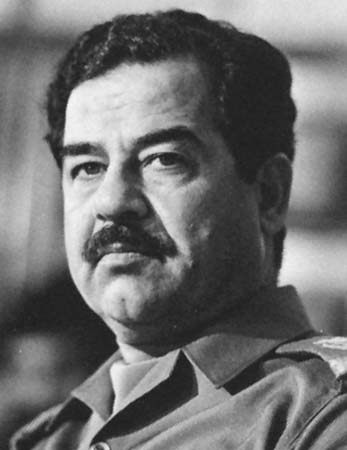Muhammad Abdul Qadir
From Worldatplay
| Line 28: | Line 28: | ||
|- | |- | ||
| style="font-size: 90%;" | '''Languages''' || style="font-size: 90%;" | Arabic, English, Hebrew, German, Farsi | | style="font-size: 90%;" | '''Languages''' || style="font-size: 90%;" | Arabic, English, Hebrew, German, Farsi | ||
| + | |- | ||
| + | | style="font-size: 90%;" | '''Other posts''' || style="font-size: 90%;" | Minister of Defence<br>Chief of the Saudi Defence Staff<br>Chairman of the State Command Council | ||
|- | |- | ||
|} | |} | ||
Revision as of 04:54, 20 January 2008
Field Marshal Muhammad Abdul Qadir | |
| | |
| | |
| | |
| In office 4 November 2006 — present | |
| Political party | None (military officer) |
| Preceded by | King Abdullah bin Abdul Aziz Al Saud |
| Succeeded by | Incumbent |
| | |
| Born | January 9 1952 (age 55) Riyadh, Saudi Arabia |
| Spouse | Samira Na'imah |
| Profession | Politician |
| Religion | Muslim (Sunni) |
| Languages | Arabic, English, Hebrew, German, Farsi |
| Other posts | Minister of Defence Chief of the Saudi Defence Staff Chairman of the State Command Council |
Field Marshal Muhammad Abdul Qadir is the 8th Prime Minister of Saudi Arabia. He is also the Saudi Minister of Defence.
Contents |
Early Life
Muhammad Abdul Qadir was born in Riyadh in 1952. Educated at first locally, he went to Yale College to learn history and economics. He returned to Saudi Arabia in 1974 to commence a military career.
Military Career
Commissioned in 1974 as a Second Lieutenant in the Royal Saudi Land Force, he did most of his training at Sandhurst. Saudi Arabia's aversion to foreign influence, and Qadir's foreign education meant that there were few opportunities for him to advance. While he was technically skilled, he lacked a lot of the connecitons necessary in Saudi Arabia. Qadir became an armour officer, and in that position he instilled technical skill, and initiative in his men. His methods, along with the fact that he could speak Hebrew earned him the nickname "The Jew".
After sixteen years in the Army, Qadir had only risen to Major when Iraq invaded Kuwait, Qadir was then an adjutant in the 4th (King Fah’d) Armored Brigade. He was quickly promoted to Lieutenant Colonel, and given command of a Regiment of AMX-30 tanks. He led his Regiment into Kuwaiti territory, and drove hard towards Kuwait City. His ensured that the Iraqis could not pin down his forces into a decisive engagement, using the high mobility of his tanks to counter the Iraqi tactic of digging in their tanks as fortifications. After the war, he was rewarded with a promotion to Colonel, and a posting to the far north east of Saudi Arabia, near Israel and Jordan.
He remained there until 2004 when he was promoted to Brigadier General, and given command of The Airborne Brigade, close to Riyadh.
2006 Abortive Coup
In October 2006, a large part of the Royal Guard, and some of the National Guard, led by Bandar bin Abdul Aziz led a palace coup in Riyadh. It was rumoured that Bandar bin Abdul Aziz was highly religious and believed his relatives were becoming anti-Islamic. He organised with other Saudi Royals in the Royal Guard and National Guard for overthrow King Adbullah. The coup was incredibly violent, with several hundred dying, including the King and most of the top of the Royal Family. The coup was put down by The Airborne Brigade of the Saudi Arabian Army, led by Brigadier General Muhammad Abdul Qadir. The only Royal who both survived, and stayed in Saudi Arabia was Abdulaziz bin Fahd, who became King. He appointed Muhammad Abdul Qadir as Prime Minister, and they jointly appointed a new "Consultative Assembly".
Qadir has been silent about the Abortive Coup, all he has said was that he acted "in the hour of the nation's need". Some has asked how Qadir could have acted so rapidly, hinting that he had advanced knowledge of the Abortive Coup, while others point to the fact that the Airborne Brigade is usually deployed near Israel, and was redeployed near Riyadh a short time before the Coup. Qadir himself dimissed the latter concern by saying that the deployment was necessary to bring the Airborne Brigade closer to the main RSAF transport base, which would make training and combat deployment easier.
Most Western commentators have simply said that Qadir is opportunistic, and when he saw his chance to achieve prominence, he took it eagerly.
Prime Ministership
Ranks and Positions
- 1974: Second Lieutenant
- 1979: First Lieutenant
- 1983: Captain
- 1989: Major
- 1990: Lieutenant Colonel
- 1991: Colonel
- 2004: Brigadier General
- 2006: Field Marshal, Prime Minister
- 2007: Chairman of the State Command Council
